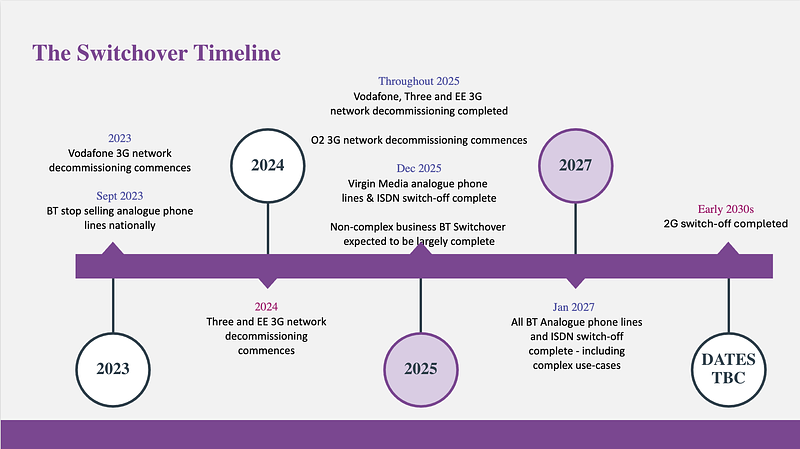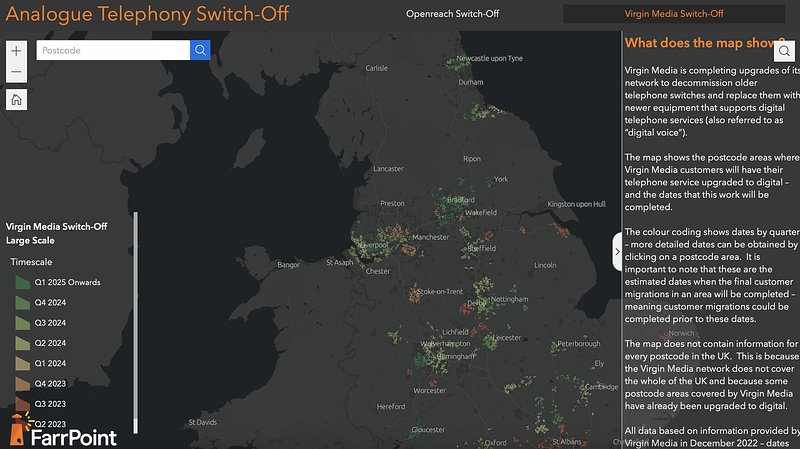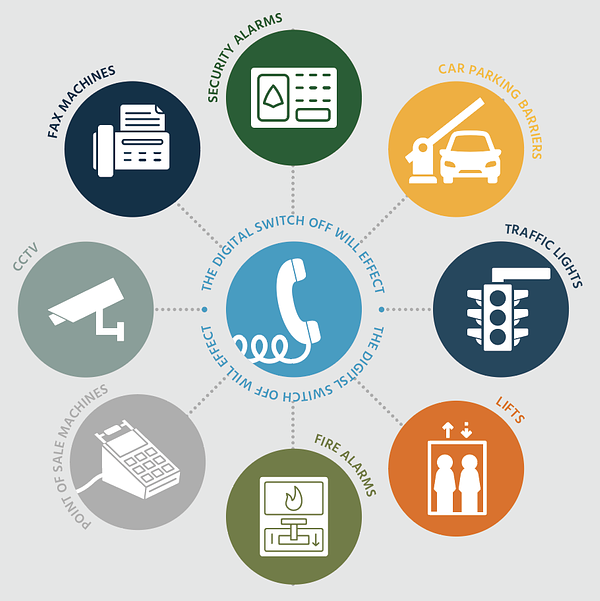
Author: (this will open in a new window)Richard Parkinson, Director at FarrPoint
Telephony as we know it is changing, and it’s happening faster than you think. These technologies have provided the backbone of communications for decades and now the Analogue Switch to Digital is in progress throughout the UK. All these analogue services must be gone by 2027.
Openreach, part of BT, the largest telecommunications provider in the UK, will permanently switch off support for all analogue communications networks by January 2027. (this will open in a new window)As of 05 September 2023 Openreach has a national stop sell in place, meaning it will no longer install new analogue telephony services. Other telephone network operators (Virgin Media and Kcom) are also working to similar timescales for decommissioning their analogue networks.
These announcements should act as the starter’s gun of a crucial race against the clock and as a warning to avoid being stuck in the starting blocks when a change has arrived. Organisations need to plan for their migration to digital services and the process will take time – before digital plans can be developed organisations must first collate information on their existing services, and this can be hard and resource intensive to obtain.

We created a simple free guide that will help you navigate all of these changes, from Analogue to Digital Switchover, to Copper and 2G/3G sunsets.
We created a couple of Analogue Switch-off maps with Openreach and Virgin Media O2 switch-off plans and dates. Simply enter your postcode to find out more.

From analogue telephone line and copper cable replacement to 2G and 3G network decommissioning, these switch-offs will affect millions of people across the UK.
We've put a useful timeline to help you better understand the switch-off dates that are approaching.
When Openreach stop supporting analogue services, their plan to move to Internet Protocol (IP) is a logical step. On the face of it, the replacement is fairly straightforward. However, it depends on what is connected to these old analogue services and what can replace them – there isn’t a one size fits all solution.
Swapping high capacity telephone trunks (usually ISDN30) for IP equivalents (usually SIP) is a relatively simple change. However, organisations typically also use a large number of other telephony services to support a range of applications for example alarms, building management, lifts, traffic management systems & (this will open in a new window)telecare. The modern communication standards used by IP phone lines, and their reliance on mains power, means that they cannot always support these kinds of legacy applications, meaning a like-for-like replacement may not always be possible.
Identifying where all these existing telephony services are being delivered, and what they’re being used for can cause a few headaches. We regularly see telephone services that were installed decades ago, with limited information available on who is using them, but bills still being happily paid.
IP telephone lines require a data network connection – this can be an issue for telephone services in locations with no data cabling, or where the service must operate during power outages. Ultimately, organisations need to consider whether there is time and budget available to address cabling issues, and what impact a potential reliance on data networks may have on support arrangements.
Examples of some of the systems affected by the Switchover.

Even though the analogue switch-off will affect many areas of businesses like telecare, traffic lights or various sensors and alarm systems, it’s not all bad news. Although a one-size-fits-all approach is not possible, there are solutions available for most applications. In addition, the switch off provides a perfect opportunity for organisations to review their telephony services and delivery arrangements. Our experience has shown that the process of rationalising telephone services and refreshing contract arrangements can deliver significant efficiency savings and simplify support arrangements.
So, the lesson? - The Analogue Switch Off isn’t happening in 2027, it is happening now! Time is running out and there is often more to the change than a first glance might reveal. The planning and implementation take time and money, and time for some has run out and is running out for others. Act now before it is too late!
We create a simple free guide that will help you navigate all of these changes.
We created a couple of Analogue Switch-off maps with Openreach and Virgin Media O2 switch-off plans and dates. Simply enter your postcode to find out more.
There is not a one-size-fits-all approach to the analogue to digital switchover as each organisation has unique needs. Get in touch with us to discuss how we could help you find the most suitable solution.
Connectivity is important. It drives business and society, bringing communities and commerce together. That's why we use our insight and experience to connect people and business.